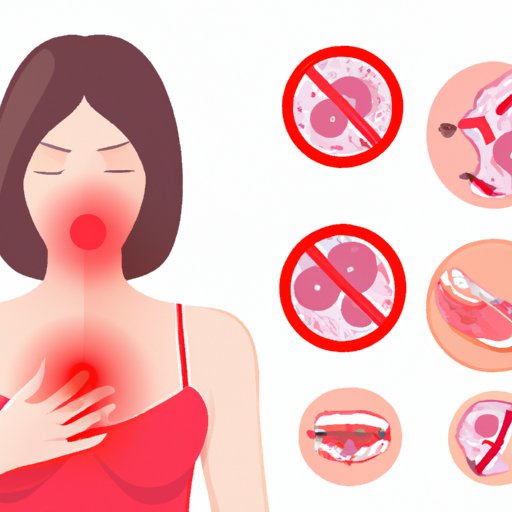
Introduction
Anemia is a common blood disorder that affects millions of people around the world. It occurs when your body doesn’t produce enough red blood cells or hemoglobin, the protein that carries oxygen in your blood. Without enough oxygen, your body can’t function properly. Anemia can affect people of all ages and genders, and it’s especially common in women and young children. It’s important to recognize the symptoms of anemia so that the condition can be properly diagnosed and treated.
Top 10 Symptoms of Anemia and How to Recognize Them
1. Fatigue and weakness: One of the most common symptoms of anemia is feeling tired all the time. You may find that you are easily fatigued and lack energy, even after a good night’s sleep.
2. Pale skin and pale gums: Anemia can also cause your skin to appear pale or yellowish. Your gums and the inside of your lower eyelids may also appear pale.
3. Shortness of breath and rapid heart rate: When your body doesn’t get enough oxygen, you may experience shortness of breath or difficulty breathing. You may also notice that your heart is beating faster than usual.
4. Dizziness and lightheadedness: Anemia can cause you to feel dizzy or lightheaded, especially when standing up too quickly.
5. Headaches and difficulty concentrating: Anemia can also cause frequent headaches and difficulty concentrating or remembering things.
6. Cold hands and feet: You may notice that your hands and feet are often cold or numb when you have anemia.
7. Chest pain and palpitations: In severe cases, anemia can cause chest pain or irregular heartbeats (palpitations).
8. Pica cravings: Anemia can cause unusual cravings for non-food items like ice, dirt, or paper, a condition called pica.
9. Brittle nails and hair loss: Your nails may become brittle and break easily, and you may notice increased hair loss when you have anemia.
10. Sore or swollen tongue: In some cases, anemia can make your tongue sore or swollen. You may also notice that your mouth feels dry or your tongue feels numb.
The Warning Signs: Symptoms of Anemia You Can’t Ignore
There are some symptoms of anemia that may require immediate medical attention. These include:
– Chest pain or rapid heartbeat
– Severe headache or blurred vision
– Shortness of breath, especially at rest or with minimal activity
Ignoring or delaying treatment for anemia can have serious consequences. Chronic anemia can weaken your immune system, making you more susceptible to infections. Severe anemia can also cause heart problems, and in some cases, it can be life-threatening.
Anemia 101: Identifying Common Signs Before It’s Too Late
Some people are at a higher risk of developing anemia than others. These risk factors include:
– Nutritional deficiencies, such as iron, vitamin B12, or folic acid
– Pregnancy or breastfeeding
– Chronic diseases like kidney disease, cancer, or HIV/AIDS
– Gastrointestinal disorders that prevent you from absorbing nutrients properly, like celiac disease or Crohn’s disease
– Heavy menstrual periods
– Blood loss from surgery, injury, or trauma
It’s important to know your risk factors and discuss them with your healthcare provider. Early detection and treatment can help prevent serious complications.
How to Recognize Anemia’s Most Common Symptoms
You can perform a simple self-evaluation to determine if you may have anemia. Take note if you experience any of the symptoms listed above, and make an appointment with your doctor if they persist.
If you’re at a higher risk of anemia due to a known condition, your doctor may recommend periodic blood tests to monitor your hemoglobin levels.
It’s important not to ignore the symptoms of anemia, as early detection and treatment can make a big difference in your overall health and wellbeing.
Are You Anemic? Spot These Symptoms Early and Take Action.
If you suspect that you may have anemia, don’t hesitate to talk to your healthcare provider. They can perform a simple blood test to check your hemoglobin levels and diagnose anemia.
Depending on the cause and severity of your anemia, your doctor may recommend changes to your diet or supplements like iron, vitamin B12 or folic acid. In more severe cases, a blood transfusion or other treatments may be necessary.
Preventive measures like eating a balanced diet, taking supplements as needed, and managing underlying health conditions can help prevent anemia in the first place.
Conclusion
Anemia is a common condition that can affect anyone, but with the right care and attention, it can be managed and treated effectively. By recognizing the common symptoms of anemia and seeking medical care if needed, you can stay healthy and prevent the serious complications that can come with untreated anemia. Don’t hesitate to talk to your healthcare provider if you’re concerned about anemia or any other health condition.




